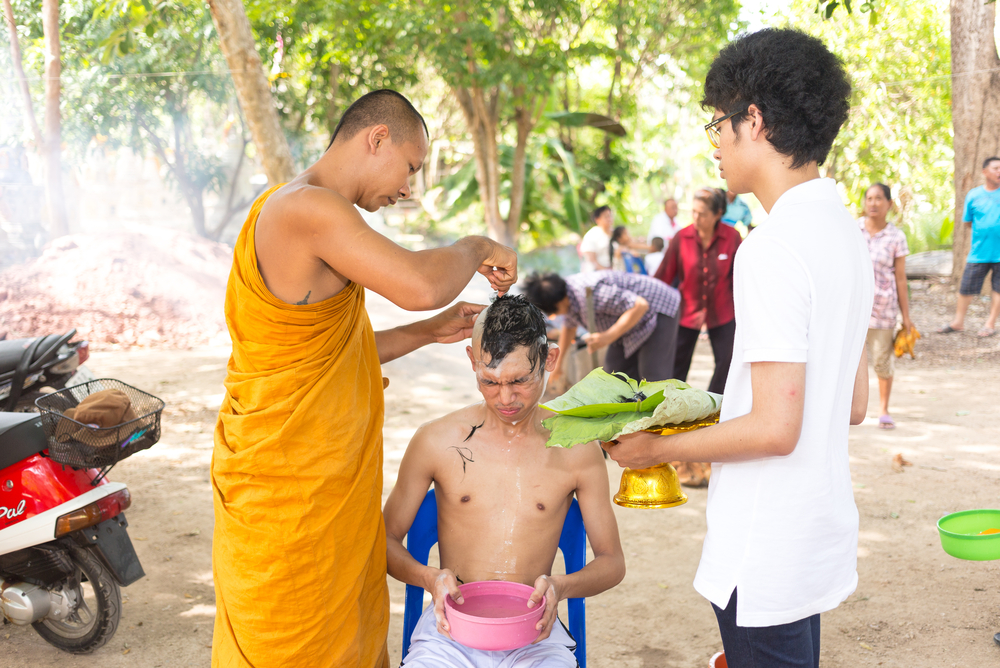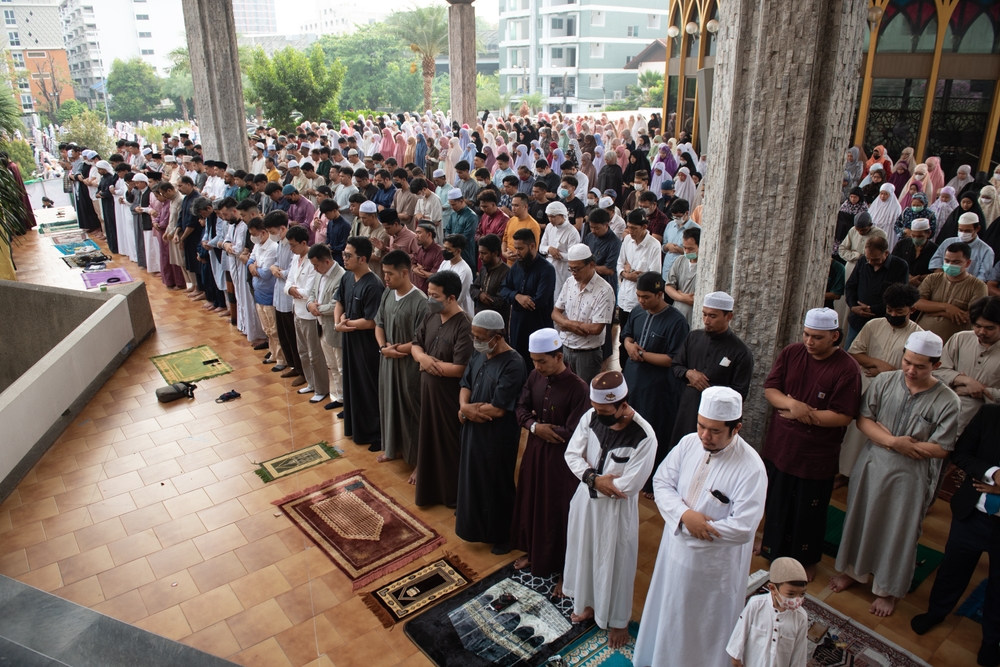Religion: Primary Religions
Buddhism
Introduction: Buddhism is the predominant religion in Thailand, with its roots tracing back to the 3rd century BCE in India. Buddhism in Thailand has been heavily influenced by Theravada Buddhism, which emphasizes the teachings of the Pali Canon and meditation.
Origin: Buddhism originated in India during the 6th century BCE with the teachings of Siddhartha Gautama, who became known as the Buddha, meaning "awakened one." The teachings spread throughout Asia, including to Thailand in the 3rd century BCE.
History: Buddhism has been present in Thailand for more than 2,000 years, but it was during the Sukhothai period (1238-1438) that Theravada Buddhism became the dominant form. The religion continued to thrive during the Ayutthaya period (1351-1767) and the Rattanakosin period (1782-present), with the establishment of monastic communities and the construction of temples.
Adherents: Approximately 95 percent of the Thai population practices Buddhism, with the majority being Theravada Buddhists. Buddhism is deeply ingrained in Thai culture and society and plays a significant role in the daily lives of Thai people.
Belief System: The core beliefs of Buddhism in Thailand are based on the Four Noble Truths and the Eightfold Path. Buddhists believe in reincarnation and karma and seek to achieve enlightenment and escape the cycle of rebirth.
Practices: Public practices include merit-making, offering alms to monks, and visiting temples. Private practices include meditation, chanting, and practicing mindfulness. Many Thai people also go on pilgrimages to holy sites such as Wat Phra Kaew and Wat Phra That Doi Suthep.
Rituals, Events, and Celebrations:
- Songkran is the Thai New Year, which is celebrated in mid-April. During the festival, people participate in water fights, pour water on Buddha statues, and visit temples to make merit and offer food to monks.
- Visakha Bucha is a Buddhist holiday that commemorates the birth, enlightenment, and death of the Buddha. It is celebrated on the full moon day in May, and people participate in candlelit processions, meditation, and other religious ceremonies.
- Kathina is a festival that takes place after the end of the three-month monastic retreat period known as Vassa. During the festival, laypeople offer robes and other necessities to the monks and participate in communal activities such as chanting and meditation.
- Loy Krathong is a festival that takes place on the full moon day in November. During the festival, people release krathongs (decorative floats made from leaves and flowers) into rivers and lakes as a symbolic gesture of letting go of negativity and making a fresh start.
- Makha Bucha is a Buddhist holiday that commemorates the Buddha's sermon to 1,250 enlightened disciples. It is celebrated on the full moon day in February or March, and people participate in candlelit processions, meditation, and other religious ceremonies.
Texts: The main texts of Buddhism in Thailand are the Pali Canon and the Tripitaka, which contain the teachings of the Buddha.
Places of Worship: Temples, also known as wats, are the primary places of worship for Buddhists in Thailand. These temples are important centers of community life, offering religious services, education, and social support.
Sacred Places: Some of the most sacred places in Thailand for Buddhists include Wat Phra Kaew, the Temple of the Emerald Buddha, and Wat Phra That Doi Suthep.
Leadership Structure: The Buddhist clergy in Thailand is led by the Sangha Supreme Council, which is responsible for regulating and overseeing the practices and teachings of Buddhism in the country. Monks play a significant role in Thai society and are highly respected and revered.
Role in Society: Buddhism plays a significant role in Thai society, shaping cultural and social norms and values. The religion is deeply intertwined with daily life, with many aspects of Thai culture, from art and literature to cuisine and music, influenced by Buddhist teachings and traditions.
Islam
Introduction: Islam is the second-largest religion in Thailand, practiced by approximately 4 percent of the population. Muslims in Thailand come from various ethnic backgrounds, including Thai, Malay, and Chinese.
Origin: Islam originated in the Arabian Peninsula in the 7th century, with the teachings of the Prophet Muhammad. It spread through trade and conquest to other parts of the world, including Southeast Asia.
History: Islam arrived in Thailand around the 13th century, primarily through Muslim traders from the Middle East and India. Over time, it spread among the Malay and Chinese communities in southern Thailand, where it remains concentrated today.
Adherents: The majority of Muslims in Thailand are ethnic Malays, who primarily reside in the southern provinces of Narathiwat, Pattani, Yala, and Satun. There is also a significant Muslim population among the Thai-Chinese community in Bangkok and other urban centers.
Belief System: Islam is a monotheistic religion that emphasizes the belief in one God, Allah, and the following of the teachings of the Prophet Muhammad as found in the Quran and the Hadith. The Five Pillars of Islam include the declaration of faith, prayer, charity, fasting during Ramadan, and pilgrimage to Mecca.
Practices: Muslim practices in Thailand include daily prayers, Friday congregational prayers, fasting during Ramadan, and charitable giving. Many Muslims also undertake the Hajj pilgrimage to Mecca at least once in their lifetime if they are able.
Rituals, Events, and Celebrations:
- Ramadan is the month of fasting in the Islamic calendar. During Ramadan, Muslims abstain from food, drink, and other physical needs from dawn until sunset. In Thailand, Muslims participate in communal iftar (breaking of the fast) and Tarawih prayers in mosques.
- Eid al-Fitr is a three-day festival that marks the end of Ramadan. During the festival, Muslims in Thailand gather in mosques and open spaces to perform special prayers, exchange gifts, and enjoy festive meals with family and friends.
- Eid al-Adha is a festival that commemorates the willingness of Prophet Ibrahim (Abraham) to sacrifice his son for Allah's sake. During the festival, Muslims in Thailand perform animal sacrifices and distribute the meat to the poor and needy.
- Maulid Nabi is a festival that celebrates the birth of Prophet Muhammad. During the festival, Muslims in Thailand participate in prayer, recitation of Quran, and lectures on the life and teachings of the Prophet.
- Takbir is a chant that is recited during the Islamic festival of Eid al-Fitr and Eid al-Adha. In Thailand, Muslims recite Takbir in the days leading up to the festival and during the festival itself to celebrate Allah's greatness and mercy.
Texts: The central religious text of Islam is the Quran, which Muslims believe to be the word of God as revealed to the Prophet Muhammad. The Hadith, which contains the sayings and actions of the Prophet, is also considered an important text.
Places of Worship: Muslim places of worship in Thailand are known as mosques or masjids, and there are more than 3,500 of them throughout the country.
Sacred Places: Some of the most significant Islamic sites in Thailand include the Central Mosque of Pattani, the historic Krue Se Mosque in Pattani, and the Masjid Ubudiah in Narathiwat.
Leadership Structure: Muslim religious leaders in Thailand are known as imams and are responsible for leading congregational prayers and providing religious guidance to the community.
Local Leaders: Some prominent Muslim leaders in Thailand include Sheikh Ahmad Qassim Al-Ghamdi, the former Imam of the Central Mosque of Pattani, and the late Imam Yacob Yusoff, a prominent figure in the Thai Muslim community.
Role in Society: The Muslim community in Thailand plays an important role in the cultural and economic life of the country, particularly in the southern provinces where it is concentrated. Muslims in Thailand have also been active in politics and have held positions in the government and parliament.
Copyright © 1993—2025 World Trade Press. All rights reserved.

 Thailand
Thailand 
